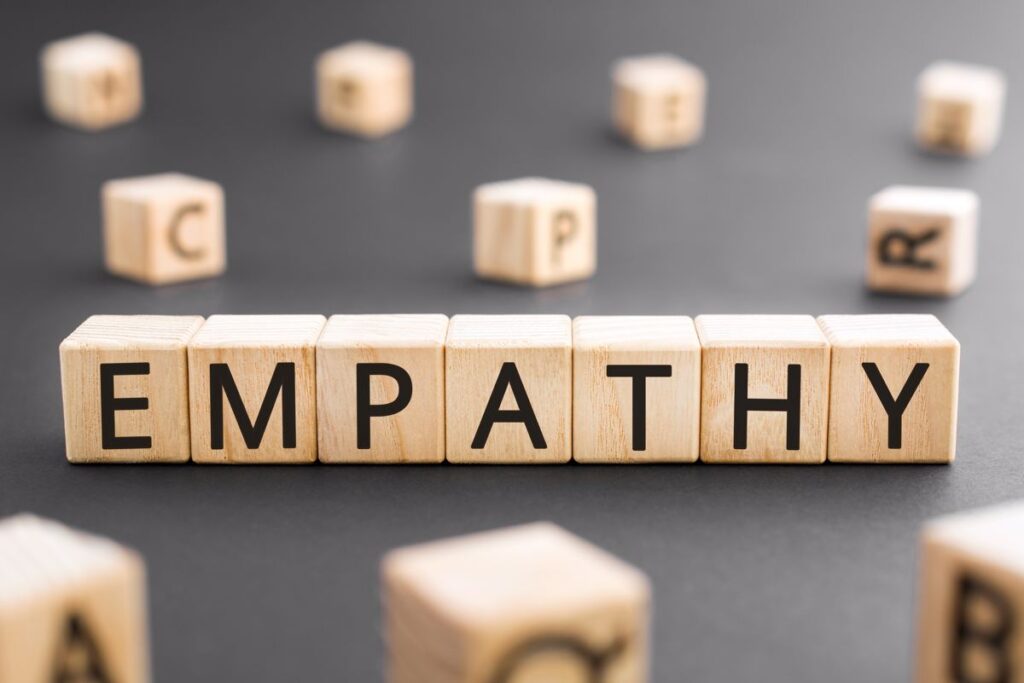
The Importance of Empathy in Leadership
Is anyone else as shocked as I am that we're entering the final month of 2022!? It feels like this year went by quicker than most. Perhaps it was the post-pandemic surge of activity and return to "normalcy."
Two things energize me in December: sprinting to accomplish goals by year-end so I can enjoy the holiday season and gearing up for the new year. The end of the calendar year gives us a chance to pause, look back, and re-set our intentions. We can reflect on what went well for us personally and professionally over the last twelve months, and where there are opportunities for improvement in the next twelve. We establish goals for the coming year and decide where we will set our focus. Here at the end of 2022, it seems like a fitting time to reflect on the practice of empathy in our relationship with family, friends, colleagues, and clients.
Empathy is defined as the capacity or ability to imagine oneself in the situation of another, experiencing the emotions, ideas, or opinions of that person. When I created my coaching practice for emerging leaders, I wanted to center the practice of empathy into every client engagement, because I have come to realize what a critical skill it is to establish trusting human relationships. When I participated in a leadership program several years ago, an exercise on empathy rocked my world and permanently changed how I think about work culture, leadership, and all my interactions with people at work or in life.
In that exercise we were challenged to write an impassioned defense of a position from the opposite viewpoint of our own, in the first-person voice. I am a gun violence prevention advocate and volunteer, so I chose to write as a gun rights advocate. On its surface, the exercise seemed easy enough. But what we discovered as we started to dig into the project was how tempting it was to take the easy way out and write with a sense of sarcasm or make statements that sounded ridiculous. The real challenge came in writing from the heart and making the piece persuasive – making that person, whose worldview was completely different than yours – sound RIGHT. To do that, I had to really become the person whose views that repulsed me. I had to immerse myself in thinking about their situation in life. The insights I gained and the emotions I felt while writing that piece have stayed with me and color the way I think about human interactions to this day.
Articles about empathy are abundant these days, thanks in large part to the pandemic. As part of their Leadership Report series on issues and trends facing the C-Suite, Fortune magazine published an article entitled, "Empathy is the go-to leadership skill of the moment – and yes, it can be learned." In that article, Kristin Peck, the CEO of a pet health company summarized the sudden emergence of empathy as a leadership essential perfectly:
"What the pandemic did was make everybody realize we were all in the same storm, but our boats were quite different," says Peck. "We had to become very clear about the importance of listening to people, and understanding their needs, and being flexible."
People in the work force were forced to step back and reflect on the role that work plays in their lives. They returned to work, or didn't, with very different priorities. My guess is that history will note the sweeping change in the way we work globally as one of the most profound impacts of COVID.
Employees are demanding that their employers, whether that is McDonalds or Microsoft, take all their human needs into consideration in a wide variety of policies and practices: virtual work, flexible schedules, PTO, family leave, and managers who care about them. People don't want to be treated like cogs in the wheel; that requires leaders who consider their team members with empathy. And that requires a new type of leadership development.
I was first promoted into a leadership role in 2005 and would have received my first "manager training" around that same time. Although it was less than twenty years ago, leadership philosophy has significantly evolved since then. Empathy was not even on the radar in the early 2000's. As a voracious reader, I collect books, so out of curiosity in writing this post, I quickly scanned some of the most popular business publications on my shelf. Winning, by Jack Welch, Good to Great, by Jim Collins, and The Five Dysfunctions of a Team, by Patrick Lencioni; each of these books defined the leadership philosophy of the era, and none of them mentions empathy as a topic in the index.
The Benefits of Empathy at Work
Why is empathy getting so much press and emphasis in organizations working to improve their culture? There are so many benefits of leading an organization with empathy and creating a culture that lives it. First, empathy creates a psychologically safe environment for people to bring their whole selves and share creative ideas and innovate without fear. Second, it creates healthy, thriving working relationships in an organization from top to bottom, which in turns helps each contributor to do their best work. Third, it creates a culture of candid, open communication, which leads to better cross-functional work. Fourth, when colleagues are practicing empathy with each other, they will be much more inclined to practice empathy with customers or clients, which leads to a great experience and healthy, thriving business relationships.
And, of course, the impact of empathy on ROI is essential. In their detailed 2018 report on Empathy in Business, Microsoft provides useful case studies of the impact of empathy on all aspects of business success. They cite a 2019 study which found that "87% of CEOs agree the company's financial performance is tied to empathy," and tellingly, "the top 10 most empathetic companies generated 50% more earnings than those ranking least."
Practicing Empathy
Since I became more aware of my capacity for empathy in my interactions with other people, particularly in my work, I have been humbled by how hard it is. At the same time, I see how critical it is for good leadership in any context. It's not a skill that we should expect to perfect, but as we keep practicing it becomes more engrained in how we instinctively behave.
I'll share an example. A few months before the pandemic, I was flying home from a business trip (a much more frequent occasion at the time). I was pulling a light carry-on bag behind me while talking on my cell phone, so I was distracted as I boarded the plane. When I lifted my carry-on and placed it in the overhead, a woman on the other side of the aisle said loudly, "are you really going to put your bag on top of my coat??" My first instinct was to say, "that's why they tell you not to place your coats in the overhead until after all the bags are in!" I held back, but I didn't apologize either, and I'm pretty sure I gave her a frosty look as I placed her coat on top of my bag and continued my phone conversation. As the plane took off, I stewed about it at first (as I tend to do when I have unpleasant encounters). Then, I made an effort to change my thinking and practice empathy. What might be going on for her? It was very possible she had a really bad day, or that the coat was brand new, or a special gift. And, after all, I had put my bag on top of it. As we left the plane later, I apologized to her, and while it was a little uncomfortable, I felt better. Hopefully she did too.
Empathy is not easy – it's hard. It requires shedding your ego and thinking about others rather than yourself. In coaching conversations, when a personal conflict situation comes up, I often ask clients to consider – what might have been going on for the other person in that moment? Is there anything that may have been distressing for them? What might they be afraid of? Fear is such a big driver of behavior, especially in high stakes work situations, so thinking about what fears what might be driving another person can be a very powerful empathy tool. Here are some other steps to consider as you practice greater empathy:
- Actively listen
- Consider your communication – are you tailoring your message to the other person, their native language, culture, knowledge-base, etc.?
- Offer to help
- Consider a different perspective – what might you be missing?
- Ask questions to clarify and get all the necessary information on the table
- Validate feelings – acknowledge what the other person is experiencing
As Brene Brown said, "empathy is communicating that incredibly healing message of 'you are not alone.'" In or outside of work, with every interaction we have with other people, we have the opportunity on a very small scale to make their world better by listening and taking the time to occupy their world for a few moments and better understand them. All those interactions add up to a huge opportunity to make the world a more empathetic, and kind, place.




